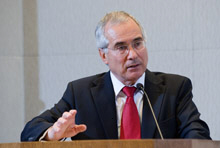
Typical street scene in Santa Ana, El Salvador. (Photo: iStock)
IMF Survey: Debating Next Steps for Climate Finance
May 25, 2010
- Climate change, poverty reduction are twin challenges facing globe
- Strict timetable for emissions reduction must be observed in any new pact
- IMF has a stake in ensuring effective framework for climate financing
The world needs an energy and industrial revolution leading to a low-carbon global economy, according to a top expert on the economics of climate change.

Nicholas Stern at the IMF: “From here to Cancun, we have to get real on what two degrees Celsius really means” (photo: IMF)
COMBATING GLOBAL WARMING
Nicholas Stern, author of the influential Stern Review on the Economics of Climate Change, spoke recently at the IMF’s headquarters on what the international community needs to do to make progress toward a meaningful global pact at 2010 United Nations climate change conference later this year in Cancun, Mexico.
Addressing a standing-room-only crowd, Stern noted that the global economy faces a plethora of challenges—sustaining a fragile world recovery, creating a stable global financial system, managing the debt of advanced countries, and unwinding global imbalances. But work on transitioning to a low-carbon economy must advance despite these other preoccupations, Stern said, because climate change is an urgent and central problem for the global economy.
“There are two defining challenges of this century: overcoming poverty in the world and managing climate change, and we succeed or fail on those two things together,” Stern said.
In the May 12 panel discussion “From Copenhagen to Cancun: Prospects for Reaching a Global Climate Change Agreement,” Hugh Bredenkamp of the IMF’s Strategy, Policy and Review Department, and Warren Evans, Director of the World Bank’s Environment Department, also spoke about climate finance and how their institutions are helping the world make the transition to a low-carbon growth model.
Taking stock of Copenhagen
Last December’s United Nations climate change conference in Copenhagen was widely viewed as a disappointment because it failed to come up with a legally binding pact. “Copenhagen wasn’t a pretty sight by anybody’s standards, but nevertheless, it did get somewhere,” Stern said.
For one thing, the conference succeeded in moving climate change up the political agenda, Stern noted. And the resulting Copenhagen Accord took several significant steps, spelling out a 2°C limit for global warming, calling for the arrangements to mobilize $100 billion a year by 2020 to address the climate change needs of developing countries, and establishing an advisory group to look at financing options.
Since Copenhagen, Stern said, good progress has been made in the areas of climate change financing and in reducing emissions from deforestation and forest degradation. But further work is still needed in the areas of technology and emissions monitoring.
“Effective, efficient, equitable”
Stern talked about what the international community should focus on in the runup to Cancun. Any global deal struck there will have to be effective, efficient, and equitable, he said.
An “effective” agreement would set out a strict timetable of carbon emission reductions—for example, targets of below 44 billion tons a year by 2020, below 35 billion tons a year by 2030, and below 20 billion tons a year by 2040.
An “efficient” agreement would favor the use of price mechanisms such as taxes, cap-and-trade schemes, and regulatory structures with implicit prices.
An “equitable” agreement would take into account countries’ wealth, as well as their past, current, and future emissions, Stern said. He endorsed the principle of “common but differentiated” responsibility—in other words, since developed countries are chiefly to blame for the current high levels of emissions, they should bear greater responsibility for it than the developing nations.
IMF and climate financing
The IMF’s Hugh Bredenkamp talked about why the IMF has a stake in seeing that the response to climate change is appropriately financed. “Developing countries and other countries will have to contend with climate change sooner or later, whether treaties are signed or not,” he said.
“If financing is not made available on the necessary scale—and on terms that developing countries can afford—the macroeconomic consequences could be disastrous, let alone the implications for addressing climate change itself,” Bredenkamp warned.
“Developing countries in particular will face an invidious choice,” he continued. “Either they’ll have to forego the spending programs that are needed to respond to climate change, which will undermine their economic growth and leave them highly exposed to climate related shocks for decades to come; or they will take on more debt than they can afford to finance those programs, destabilizing their economies and compounding the long-term problems that they face.”
For these reasons, the IMF has proposed a plan to mobilize new financing on a large scale, much of it on concessional terms, to help developing countries address climate change. The so-called “Green Fund” is being offered as a contribution toward broader public debate on a vital global issue—the IMF is not planning to create, finance, or manage it.
Climate change and development
The World Bank’s Warren Evans talked about challenges faced by his institution in its climate change work. One difficulty, he said, is that the World Bank is a country-driven institution, while climate change is a global issue. Evans and his colleagues also struggle with how to share risk with the private sector and how best to impart knowledge acquired in one part of the world to countries elsewhere.
The World Bank has achieved notable successes—breaking critical ground in the late 1990s with the world’s first carbon fund and, more recently, initiating the Clean Technology Fund, which funds the deployment of clean technology to reduce emissions in developing countries.
But the institution has seen a big mentality change since the early days of its climate change work, Evans noted. When the World Bank first started engaging with the world’s poorest countries on the issue, the countries protested, saying that they shouldn’t spend money on climate change. Today, he said, many of these same countries are now acknowledging that the dealing with the impact of climate change is one of the most important issues they face.



